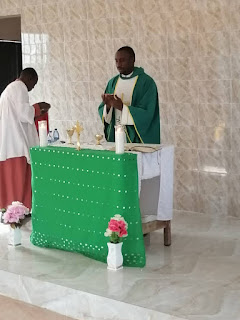LET YOUR LAMPS BE BURNING BRIGHTLY
Homily for the Thirty-Second
Sunday in Ordinary Time, Year A
Fr. Ugochukwu
Ugwoke, ISch
Scriptural Texts: Wisdom
6:12-16; 1 Thessalonians 4:13-18; Matthew 25:1-13
We
are gradually approaching the end of the calendar and liturgical years, and the
Gospel reading of this thirty-second Sunday aligns with this consciousness by
emphasizing the importance of being spiritually ready for the culmination of
time. The culmination of time will be the second coming of Christ and Jesus uses
the parable of the ten virgins to teach us lessons on the importance of vigilance
and preparedness in anticipation of the coming of the Bridegroom, symbolizing
the return of Christ in glory.
In
the parable, ten virgins took their lamps and went out to meet the bridegroom (Matthew
25:1-13). Five were wise, bringing extra oil for their lamps, while the other
five were foolish, taking only their lamps. As they waited for the bridegroom’s
arrival, they all fell asleep. At midnight, a cry announced the arrival of the
bridegroom. The virgins woke up and trimmed their lamps. The foolish ones,
realizing they were running out of oil, asked the wise virgins for some.
However, the wise virgins refused, suggesting that there might not be enough
for all of them and advising the foolish virgins to go and buy more oil. While
the foolish virgins went to buy oil, the bridegroom arrived, and those who were
ready went into the wedding feast with him.
This
parable speaks directly to the reality of our lives. As Christians, we are a
pilgrim people, journeying toward the eschatological banquet, the heavenly
feast prepared by the Bridegroom for his Bride, the Church. The virgins represent
all the believers. The lamps symbolize our faith, the divine light within us
that guides our journey. The oil in the lamps represents the abundance of
grace, the fruits of a life lived in constant communion with God. The lamps,
symbolic of our faith, are meant to be lit and burning brightly as we await the
arrival of the Bridegroom - Christ himself.
The
distinction between the wise and the foolish virgins lies not in the possession
of lamps, but in the foresight to bring extra oil. The wise virgins exemplify
spiritual prudence - they are prepared for the unexpected delay in the
bridegroom’s arrival. In our lives, the extra oil signifies the depth of our
relationship with God, sustained through prayer, virtue, and a resilient faith.
The foolish virgins, lacking the extra oil, represent those who postpone their
spiritual preparedness. Their plea for oil from the wise virgins echoes the
urgency that can arise in our lives when we realize our faith needs
replenishing. The lesson is clear: procrastination in matters of faith can lead
to missed opportunities and exclusion from the joyous feast.
The
midnight cry announcing the arrival of the bridegroom underscores the
unpredictability of divine timing. It challenges us to be vigilant, always
ready for the Lord’s coming. This echoes Jesus’ earlier words, “Therefore, stay
awake, for you know neither the day nor the hour” (Matthew 25:13). Our faith
journey is not a sprint but a marathon, demanding sustained vigilance. The
closed door symbolizes the moment when the opportunity for preparedness ceases.
In
order to be prepared and vigilant for the coming of the Bridegroom, we need the
virtue of wisdom just like the five wise virgins. In the first reading (Wisdom
6:12-16), we hear the resounding call of Wisdom herself. Wisdom is described as
a resplendent light, a reflection of eternal light, and a mirror of God's
goodness. The pursuit of Wisdom is not merely an intellectual exercise but a
journey toward divine understanding. This Wisdom, transcendent and divine,
beckons us to seek her with ardor, for in her embrace, we find the path to
righteousness.
Finally,
as we contemplate this parable, let us examine our own lamps of faith. Are they
well-stocked with the oil of prayer, love, and good works? Are we living in
anticipation of the bridegroom’s coming, or have we allowed our lamps to
flicker? May this parable inspire us to embark on a journey of continuous
spiritual preparedness. Let us cultivate the wisdom to keep our lamps burning
brightly, recognizing that our faith is not a static possession but a living
flame that requires our intentional care.



Thank you Fr ugochukwu. God bless you
ReplyDelete